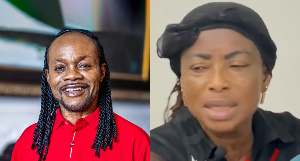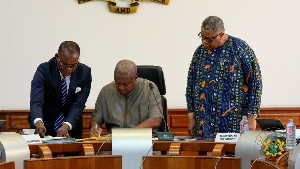Dr Mohammed Ibn Chambas, Member of Parliament for Bimbilla, on Wednesday called for a special intervention by government and donor partners to bring about equity in Ghana's educational system.
He described as unfortunate the situation where more than 40 years of post-colonial development could not resolve the historical inequity between Northern and Southern Ghana.
Dr Chambas was delivering a lecture on "Challenges of education in the North", as part of the Golden Jubilee celebration of the Tamale Secondary School.
He said "it is in the nation's interest that no region or segment of the Ghanaian population lags too far behind in our effort to become a middle-income nation by the year 2020."
The golden age of business could not be attained if a significant proportion of the nation's population remained illiterate and therefore marginalised from the mainstream of national economic life, he said.
He suggested that the National Poverty Reduction Strategy should give special focus to addressing the continuing imbalance between the North and the South "with the view to closing, if not eliminating, the wide gap."
Dr Chambas said with the government's bid to provide each district with a first-rate secondary school, special attention must be paid to achieving higher enrolment in basic schools, especially among girls in the North.
He noted that government and donor inputs would not by themselves produce quality education, saying that the supervisory role, particularly of parents and communities, were essential.
Dr Chambas urged parents, old students of the various schools, the private sector, religious bodies and non-governmental organisation to take centre stage to demand the provision of affordable and quality education. He said majority of people in the North were living below the poverty line and could not pay for the education of their children.
"There is therefore the need for a coping mechanism or safety net to be instituted to address the peculiar circumstances of such people to enable them to pay the school fees of their children at all levels of the educational ladder."
Dr Chambas said, apart from poverty, the official colonial policy of separate development had a lasting negative effect on the development of education in Northern Ghana.
Under the colonial policy, the North was to act as a labour reserve for the emerging economic sectors of Southern Ghana that catered for the needs of the Imperial British industries. Dr Chambas said while in 1929, Southern Ghana had 117 government-assisted schools, the Northern territories had only four.
He said the basis of the Northern territories joining Ashanti and the colony for independence was that special measures would be instituted to bridge the gap in development between the North and the South.
"However, the gap has now become wider in some sectors and Northern Ghana trails behind the rest of the country." Dr Chambas said most of the schools in the Northern sector were in deplorable state and needed major physical rehabilitation and expansion as well as massive provision of teaching materials and equipment.
He said the teaching and learning processes were abysmal and that exceptional students who came out of them with average grades could not compete for placement in the universities.
"It is even more painful if the few who struggle against all odds and gain admission into the university are unable to take up the offer because they do not have the money to pay the fees."
He said 25 students from Northern Ghana could not be enrolled into the university last academic year, because they did not have the money to pay.
General News of Thursday, 29 November 2001
Source: .
Chambas calls for equity in educational system
Entertainment

Daddy Lumba's 'ghost' is tormenting us – Aunt cries out
Opinions









